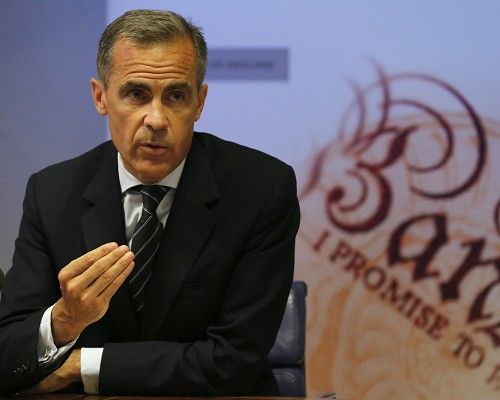

Bank of England governor Mark Carney appeared to bring forward the prospect of a rise in interest rates today even as he said they could be cut further should low inflation persist.
Mr Carney said the Consumer Price Index (CPI) measure of inflation was "more likely than not" to turn negative in the spring.
But the pound rose as the governor said: "Unusual as that is, it arguably isn't the main story. The headlines today mask stronger underlying dynamics which will determine UK output and inflation tomorrow."
Mr Carney said the next move in monetary policy was still judged most likely to be a rise in interest rates.
The Bank's quarterly Inflation Report nudged up expectations for CPI at the end of the coming three-year period, predicting that the factors currently pushing it lower would fade and lifting forecasts for wages and economic growth.
Sterling climbed to a seven-year high against the euro while it was also up by a cent against the US dollar as economists said Mr Carney had left the door open for an interest rate hike before the end of this year.
The forecast for inflation over the next few years contrasted with near-term predictions, suggesting CPI would average around zero in the second and third quarters of this year, before starting to climb before the end of 2015.
Mr Carney said the current period of low inflation - boosting spending power - was positive for the economy. Latest official figures showed it fell to 0.5% in December, equalling an all-time low.
But he indicated that should it prove more persistent than currently expected and threaten a "self-reinforcing" spiral, the Bank's Monetary Policy Committee (MPC) would need to provide "more support".
This could include an expansion of its £375 billion money printing programme, known as quantitative easing, or a cut in interest rates further towards zero from the current rate of 0.5%.
Mr Carney has previously only cited the possibility of a slower-than-expected rise in interest rates rather than a reduction from the current 0.5% He said UK lenders had beefed up their balance sheets in the wake of the financial crisis meaning they were now more able to cope with an interest rate cut - which could hit their earnings from mortgages and therefore availability of credit.
Officials need to guard against persistent negative inflation as it is feared this could lead to a spiral of deflation in which consumers put off purchases and firms postpone investment.
In a letter to Chancellor George Osborne published alongside the Inflation Report, Mr Carney said the UK was not experiencing deflation in this "persistent and generalised" sense.
He said: "The economy is growing strongly, unemployment is falling and earnings growth has been picking up in recent months."
The governor was obliged to write the letter because inflation had veered more than 1% off the Bank's 2% target. Mr Carney said he would "likely write a few more before the year is out".
In a reply to the governor, Mr Osborne said he welcomed "that the MPC remains vigilant to both upside and downside risks to its forecast and stands ready to act if these risks materialise".
Today's inflation report said that while current CPI was off target by 1.5%, two-thirds of this, or 1%, was due to the effect of lower energy, food and other goods prices. Weak wages were also a factor.
However, the Bank expects some of these effects to fade later this year, while it said there were also signs that pay growth was picking up.
The Bank has left its expectation for UK economic growth at 2.9% for this year and uprated it from 2.6% to 2.9% for next year and from 2.6% to 2.7% for next year.
Real terms post-tax household income is expected to have risen by 2.5% last year up from 1.5%. For 2015 they are expected to rise 3.5%, up from 1.25% and for next year by 3%, up from 2.5%.
Inflation at the end of the three-year horizon is expected to reach 2.15%, up from 1.95%.
Comments
Comments on this story express the views of the commentator only, not Bailiwick Publishing. We are unable to guarantee the accuracy of any of those comments.